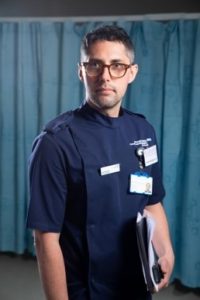This we ek’s blog comes from Nicolas Aldridge, Lead Nurse for Research and Development at UHCW NHS Trust and a NIHR 70@70 Research Leader. He has worked in research for past 13 years and is passionate about increasing research opportunities for patients, and promoting a clinical career in research for nurses and midwives.
ek’s blog comes from Nicolas Aldridge, Lead Nurse for Research and Development at UHCW NHS Trust and a NIHR 70@70 Research Leader. He has worked in research for past 13 years and is passionate about increasing research opportunities for patients, and promoting a clinical career in research for nurses and midwives.
The emergence and presentation of Covid 19 struck the clinical research delivery nurses, midwives and AHPs like all other NHS teams. It brought a sense of fear of the unknown, uncertainty of the direct impact on individuals, anxiety for personal and family safety. All whilst trying to ensure the clinical safety of patients participating in ongoing research studies and trials. More questions than answers presented, but the overwhelming theme throughout was “what can we do to help?”. To start with this remained a question without an answer, but not for long.
It was clear that a new research speciality had emerged in which we have no experience. As across all NHS research teams all non-Covid Research was put on hold to new recruitment and the research workforce became a Covid Research Workforce. This meant that a research department set up to run 5 days a week, needed to react and offer 7-day service from the same establishment. Although all staff responded positively to this request, I am sure that this added additional pressure to an already pressured team. At the time it is very difficult to see the wood for the trees but even in the relatively small amount of time that has passed since Covid became a realty it is useful to reflect on what actually happened over those first few weeks.
When broken down into black a white it is surprising that staff managed so well with the ever-changing research landscape that was happening daily, if not hourly. Firstly, staff are told that a pandemic is coming, the transmission and impact of which were widely unknown and that they will be working directly with these patients. Secondly, the research speciality that you have chosen to work in is being put on hold indefinitely and you are needed to support Covid 19 research. Thirdly, the working pattern you have no longer meets service need and we need you to change this pattern.
Anyone that has worked with any change management process knows that change takes time, unfortunately time was not an option. I would say the largest challenge any of us have ever faced at work happened with change coming rapidly, not in isolation but simultaneously with further change. Alongside this we had media coverage of this ‘new speciality’ of Covid research, the likes in which we have never seen before. Every new study or breakthrough gained media coverage and research staff suddenly became very popular, not only with our NHS colleagues wanting to know what was happening, but also with our family and friends. Now, staff and the public were looking to research departments across the NHS for information and reassurance.
As I sit back and read the above I am overwhelmed with pride and admiration for the staff that have worked with on Covid research studies; those who changed specialities and working practices, working patterns and moved family life to enable this to happen, managing their own anxieties and fear. We discussed this with the senior research nurses and midwives at our first meeting since Covid and explored how our department was able to adapt and deliver so quickly. The answer was simply the word shared in the title of all our roles “Research”. Research itself is the speciality that all clinical research delivery professionals have in common, this may be applied to different clinical specialities, but the core elements and principles of robust clinical research practice was the unifying factor. This was evident in how staff from different areas came together, many of whom had never worked together before, and have been able to deliver high quality research that continues to inform our understanding and treatment of Covid 19 patients.
This discussion consolidated our understanding that Research Nursing, Midwifery, and associated roles do indeed have a shared specialty – ‘Research’.
I believe this is something that should be acknowledged as a specialty within its own right, and for all research staff to be proud of their chosen speciality – I certainly am.
So, to all our research focused staff across the NHS a massive THANK YOU for all the hard work and dedication.